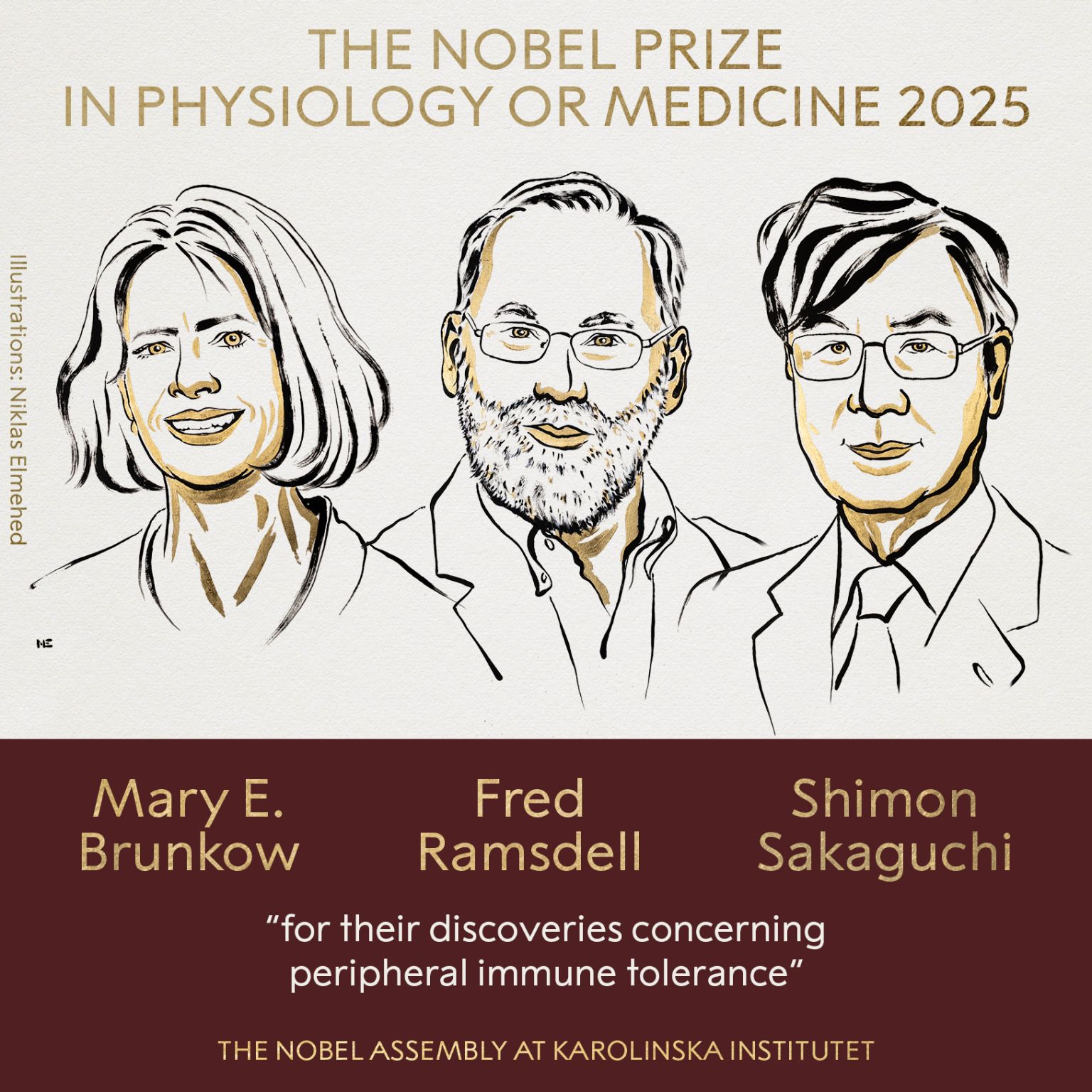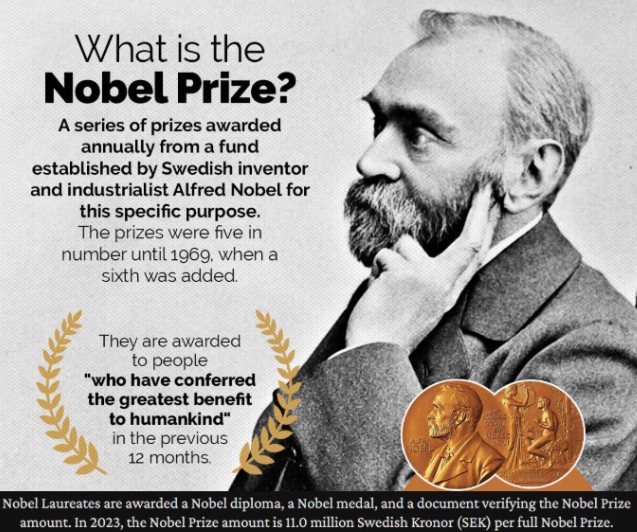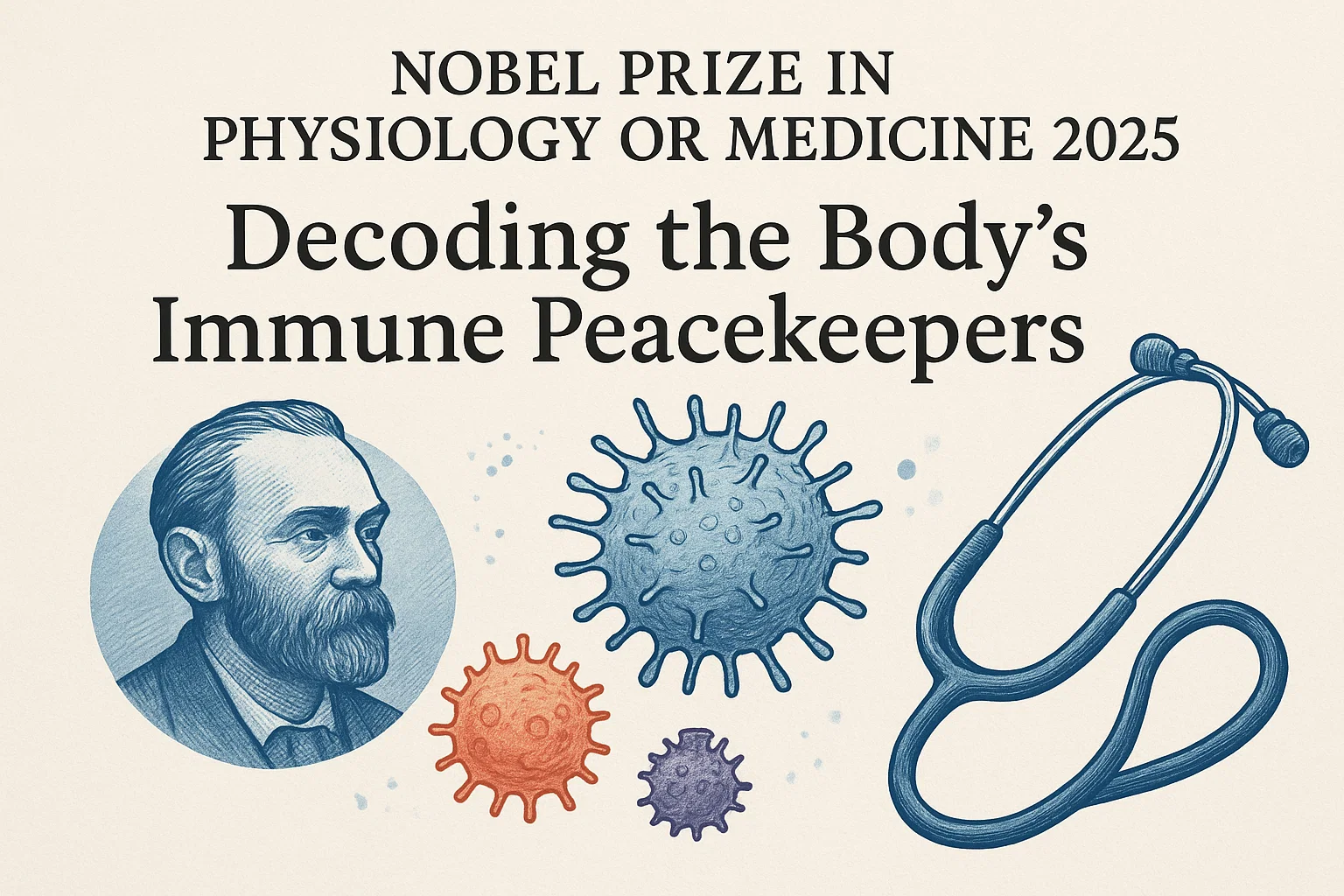Nobel Prize in Physiology or Medicine 2025
The 2025 Nobel Prize in Physiology or Medicine honours Shimon Sakaguchi, Mary E. Brunkow, and Frederick Ramsdell for uncovering regulatory T cells and the FOXP3 gene, revealing how immune tolerance prevents autoimmunity and transforms modern therapies.
Context
The 2025 Nobel Prize in Physiology or Medicine has been jointly awarded to Shimon Sakaguchi (Japan) and Mary E. Brunkow and Frederick Ramsdell (United States) for their groundbreaking discoveries on peripheral immune tolerance — a vital mechanism that prevents the immune system from attacking the body’s own cells. Their work has reshaped our understanding of immunity, autoimmunity, and immune-based therapies.

What Has the Nobel Prize in Physiology Been Awarded For?
By the 1980s, scientists had already established the concept of central tolerance, in which immature T cells that recognise and attack the body’s own proteins are destroyed in the thymus before they can circulate. However, this alone could not explain why, in some cases, the immune system still attacked self-tissues or how tolerance was maintained outside the thymus.

This gap led to the discovery of a secondary, equally crucial safeguard — peripheral tolerance.
Discovery of Regulatory T Cells (Tregs)
Japanese immunologist Shimon Sakaguchi hypothesised that beyond central tolerance, the body possessed a special class of “policing” T cells capable of restraining other immune cells from attacking self-tissues.
His experiments provided the first clear evidence of this idea:
-
When the thymus was removed from newborn mice, they developed severe autoimmune diseases.
-
When T cells from healthy mice were injected into these animals, the autoimmune symptoms disappeared, demonstrating that a unique group of cells could suppress harmful immune reactions.
Sakaguchi identified these cells as regulatory T cells (Tregs) and termed their action peripheral tolerance, referring to the immune regulation occurring outside the thymus.
FOXP3 Gene and Autoimmunity
Around the same time, Mary E. Brunkow and Frederick Ramsdell were investigating a mysterious strain of mice known as scurfy mice, which suffered from fatal autoimmune disease. Through meticulous genetic analysis, they pinpointed the FOXP3 gene as the cause.
Mutations in FOXP3 disrupted the normal development of regulatory T cells, leading to uncontrolled immune responses.
Sakaguchi’s subsequent work confirmed that FOXP3 acts as a master regulator controlling the formation and function of Tregs. Without it, the immune system loses its self-control.
This discovery established a vital link between genetics and immune regulation, explaining how a single gene could govern the balance between protection and destruction within the immune system.
Significance of the Discovery
The Nobel-winning findings have transformed modern immunology and medicine, revealing how immune balance is maintained — and what happens when that balance collapses. The implications extend across several key areas of medical science:
1. Autoimmune Diseases
Autoimmune diseases, such as lupus, rheumatoid arthritis, type-1 diabetes, and multiple sclerosis, occur when the immune system mistakenly attacks the body’s own tissues.
By understanding how regulatory T cells work, scientists can now explore therapies that enhance Treg activity to calm hyperactive immune responses. Clinical trials are investigating Treg-based therapies to restore immune tolerance and halt the progression of chronic autoimmune conditions.
2. Organ Transplantation
One of the biggest challenges in transplantation medicine is preventing the immune system from rejecting a new organ.
Traditionally, this requires lifelong immunosuppressive drugs, which increase vulnerability to infections and cancers. The discovery of Tregs offers a potential alternative: inducing or transferring Tregs to promote immune acceptance of transplanted organs without broad immunosuppression, allowing for safer and more durable transplant success.
3. Cancer Treatment
Paradoxically, the same cells that prevent autoimmune diseases can also shield tumours from immune attack. Many cancers exploit Tregs to suppress anti-tumour immunity, enabling them to grow undetected.
Modern cancer immunotherapies, including checkpoint inhibitors and CAR-T cell therapies, are now being refined to selectively block or deplete Tregs within tumours, unleashing the body’s own immune cells against cancer.
However, as Dr Hasmukh Jain of the Tata Memorial Hospital cautions, this delicate balance must be handled carefully — reducing Tregs can strengthen anti-cancer immunity, but may also trigger autoimmunity if tolerance is lost. Thus, the therapeutic challenge lies in fine-tuning immune regulation without disturbing equilibrium.
A Transformative Legacy
The 2025 Nobel Prize recognises not just the discovery of a cell type or a gene, but a fundamental shift in how we understand the immune system — from a purely defensive army to a highly regulated force capable of restraint and balance.
The work of Sakaguchi, Brunkow, and Ramsdell has opened doors to precision immunotherapy, where diseases can be treated by restoring or reshaping the body’s own immune tolerance. Their contributions stand as a testament to decades of curiosity-driven research that continues to shape the future of medicine.
Subscribe to our Youtube Channel for more Valuable Content – TheStudyias
Download the App to Subscribe to our Courses – Thestudyias
The Source’s Authority and Ownership of the Article is Claimed By THE STUDY IAS BY MANIKANT SINGH





